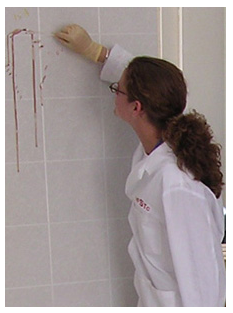Archival Notice
This is an archive page that is no longer being updated. It may contain outdated information and links may no longer function as originally intended.
Home | Glossary | Resources | Help | Contact Us | Course Map
In some instances, collection of samples poses a significant challenge. In general, the best collection strategy is to submit the entire item. This can be easily accomplished for items such as a small rock, clothing, or a knife, but is more difficult in the case of larger, fixed objects. In cases where the samples can be collected using a slightly moistened swab, such as from a window, the collection process is fairly straightforward. Some problems can arise when a hard porous surface, such as pavement or concrete, is encountered. In these cases, it can be difficult to collect small bloodstains or other biological fluids by swabbing. There are occasions where scraping the substrate containing the biological sample is a viable option. However, care must be taken. For example, if the crime scene is outdoors, wind could cause loss of sample or contamination of another item.
Take the course "What Every Law Enforcement Officer Should Know About DNA Evidence"
Additional Online Courses
- What Every First Responding Officer Should Know About DNA Evidence
- Collecting DNA Evidence at Property Crime Scenes
- DNA – A Prosecutor’s Practice Notebook
- Crime Scene and DNA Basics
- Laboratory Safety Programs
- DNA Amplification
- Population Genetics and Statistics
- Non-STR DNA Markers: SNPs, Y-STRs, LCN and mtDNA
- Firearms Examiner Training
- Forensic DNA Education for Law Enforcement Decisionmakers
- What Every Investigator and Evidence Technician Should Know About DNA Evidence
- Principles of Forensic DNA for Officers of the Court
- Law 101: Legal Guide for the Forensic Expert
- Laboratory Orientation and Testing of Body Fluids and Tissues
- DNA Extraction and Quantitation
- STR Data Analysis and Interpretation
- Communication Skills, Report Writing, and Courtroom Testimony
- Español for Law Enforcement
- Amplified DNA Product Separation for Forensic Analysts


